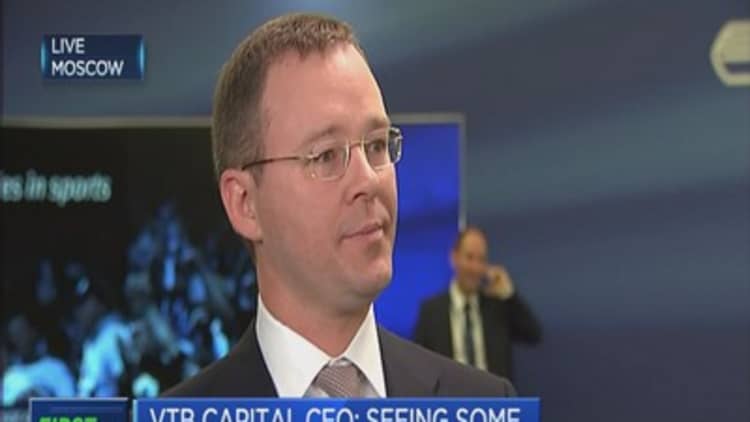
Russia's isolated banking sector is hoping for a swift end to sanctions and capital flight, the chief executive of one of the country's largest investment banks told CNBC.
Alexei Yakovitsky, global chief executive and chairman of VTB Capital, a key part of the VTB investment banking group, told CNBC that the country's banking sector has struggled to access external sources of funding due to western sanctions on Russian business activity.
"Generally, I think that whenever the lifting of sanctions happens it's going to be a major positive shock, a major positive outcome for the market and you'll see a significant improve across all fronts and obviously VTB Capital will be a big beneficiary of this," Yakovitsky told CNBC in Moscow.
Russia's economy has been on a rollercoaster ride over the last couple of years since the government's annexation of Crimea in March 2014 and role in the pro-Russian uprising in Ukraine resulted in the European Union and the U.S imposing sanctions.
That economic isolation, coupled with the low price of oil, has weighed greatly on the country's currency, the ruble, and its economy which is expected to experience a 3.8 percent contraction in gross domestic product (GDP) in 2015.
Read MoreNot optimistic sanctions will be lifted in '16: Russian FinMin
Sanctions have crippled Russia's financial sector and a number of lenders, VTB included, have had to be recapitalized by the Russian government. VTB, Russia's second-largest bank by assets, was the subject of a $5 billion of state recapitalization program in July, implemented as part of a wider state plan to help stimulate lending amid a wide economic slowdown.
Despite having to receiving state aid, Yakovitsky said VTB Capital's range of services and financial products had allowed it to increase its share of the industry, although the sector itself had got smaller.
"We've a product suite that allows us to remain relevant for our clients throughout the entire business cycle…you have to realize that with the markets being shut down for a significant period of time with our clients having no or very little access to external capital, the demand for internal financing went up, our market share generally went up because our clients needed more from us," he said.
Read MoreEurope's crisis of confidence
"The pie shrank -- temporarily, hopefully -- but our share of the pie increased very significantly." When asked if VTB would make a profit this year, however, he was elusive, saying "hopefully."
Despite the tough economic backdrop, Yakovitsky was optimistic that Russia was starting to recover slowly.
"Obviously, Russia's economy has been going through a fairly tough adjustment, largely driven by external shocks. I'd say we're either at the bottom or pretty close to it. I think we're starting to see the early signs of things turning the corner- the economy is adjusting fairly quickly," he said.
Read MoreRussia ready to meet OPEC to talk oil prices
"But I think you're looking at a marginally positive result (in terms of GDP) in 2016, this will be driven by import substation, by the impact of the weak ruble and just the latest statistics show a reversal of capital flight with capital coming back in, which is also an early positive sign," he said.
Speaking to CNBC in Lima on the sidelines of the International Monetary Fund/World Bank annual summit, Russian Finance Minister Anton Siluanov said the Russian banking sector was not expected to see "any significant growth of banking sector profits" this year.
"For the banks and the financial sector – for the so-called non-trading sectors – it's a different situation because of the reduction in capital inflows and the fall in the oil price. Taking this into account, last year the government decided to issue one trillion treasury bonds, in order to inject this money into capital banking system of the Russian Federation."
This act had "allowed many of the banks to make necessary provisions towards non-performing loans without creating further pressure on their capital and to help them promote credit financing which is a very important thing at this time for the Russian economy," he said.
- Written by CNBC's Holly Ellyatt, follow her on Twitter @HollyEllyatt. Follow us on Twitter: @CNBCWorld






